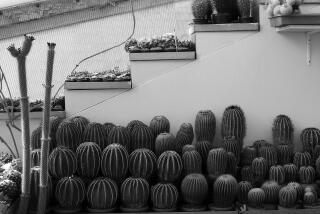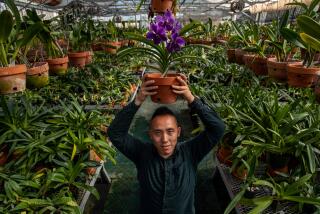Thailand Targets Poachers and Peddlers of Endangered Wild Orchids
- Share via
BANGKOK — Clad in jungle fatigues and black berets, the team begins its morning sweep, stalking past steamy stalls and peering suspiciously at lush tropical vegetation.
“Stick close. One of us got stabbed on the last raid,” team leader Thani Parnsuwan tells an accompanying photographer as more than a dozen of his men fan out through the Chatuchak outdoor market, one of Asia’s largest.
The search isn’t for heroin traffickers or weapons smugglers, both plentiful in Thailand, but for vendors of beautiful, delicate orchids ripped out of the forests for illegal sale at home and abroad.
Thailand’s more than 1,300 wild orchid species are suffering immense damage at the hands of man--from illegal logging, slash-and-burn farming, forest fires and collection by impoverished rural families.
Villagers on roadsides abutting forests and national parks are often seen hawking the legally protected plants to passing motorists. Dealers also transport them for sale at markets like Chatuchak, where officials say 42,835 orchids of 203 species were seized in raids last year.
A sizable percentage of contraband orchids is funneled into a booming international smuggling network, with hobbyists in Japan, Taiwan, the United States and Europe snapping up prized specimens from Thailand as well as Brazil, Central America, China, India, Indonesia, Madagascar, Malaysia, Papua New Guinea, South Africa and Venezuela.
“We don’t really want to go after the poor people when they have to make a living. We want to go after the big, rich traders,” says Wichar Thitiprasert, who heads a Ministry of Agriculture unit trying to halt illegal trade in flora.
A half-dozen foreigners, including German and Dutch nationals, and several Bangkok traders have been put on a “watch list” of suspected smugglers. But traffickers are rarely caught.
Wichar and others say smugglers fake or alter export licenses and use indirect shipping routes to sneak orchids out of a country. One of the most effective methods is simply sending orchids via air express parcels.
Larger shipments often get through because customs inspectors can’t tell wild orchids from artificially grown, and thus legally traded, plants.
In recent cases, one smuggler sent a batch of nearly extinct orchids from Borneo, worth up to $3,000 apiece, to Thailand, then mixed them with ordinary Thai varieties. The shipment was caught at Bangkok’s airport as it was about to be forwarded to Poland, but the trafficker escaped.
A Japanese placed hybrid orchids over endangered lady’s-slipper orchids in an effort to smuggle a shipment to Japan. He was caught.
“The Thais have a better record of trying to stop orchid smuggling than any country in the world,” says Ger van Vliet, an official with the Switzerland-based Convention on International Trade in Endangered Species.
Among other animals and plants, the international convention protects all the estimated 20,000 orchid species and identifies 120 of them as highly endangered. An unknown number are extinct.
Wichar concedes that only a dent has been made in trafficking, saying the volume is too great and the penalties too small. The Japanese smuggler, for example, was merely fined 3,000 baht ($83) and given a one-year suspended jail term.
Thai experts say that along with law enforcement, the restoration of orchids will require reintroduction of plants into the wild and efforts to stop further pillaging by villagers.
At Mae Jo University in northern Thailand, researchers grow some 170 native species in laboratories for transplanting in nature reserves as well as around monasteries and schools. Some 60% survive.
The project, which began in 1994, also distributes orchid seeds to villagers in hopes they will grow their own flowers for sale rather than plucking them from their natural habitat.
“I understand that people have to make a living, but I love the forest more than people making money,” Thani, the Forest Department officer, says as his men load a medium-size truck with orchids seized from the sometimes angry vendors at Chatuchak.
Pro-orchid sentiments like Thani’s are common in Thailand, where cheap hybrids enliven slum houses and avid collectors pay thousands of dollars for the finest specimens. The country ranks No. 1 in Asia as a legal exporter of commercially grown orchids.
Thai Airways, the national airline, paints a purple and white orchid on each of its planes. Hotels, restaurants, shops and companies name themselves after the flower.
Despite the love affair, conservationists fear orchids will soon be found everywhere--except the forests where they originated.
More to Read
Sign up for Essential California
The most important California stories and recommendations in your inbox every morning.
You may occasionally receive promotional content from the Los Angeles Times.













